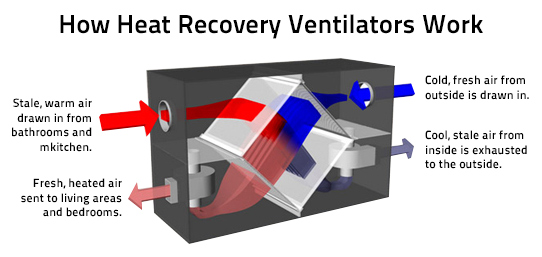Expert Tips to Maximize HRV Efficiency
Wiki Article
Discovering the Advantages of Heat Recovery Ventilation for Energy Efficiency in Homes
Heat Recovery Ventilation (HRV) systems offer house owners a functional technique to enhancing energy performance. By recovering warmth from outbound air, these systems can significantly decrease heating & cooling expenses. In addition, they give a consistent supply of fresh air, enhancing indoor air top quality and comfort levels. As homeowners take into consideration sustainable options, recognizing the nuances of HRV systems ends up being increasingly important. What aspects should one assess prior to making such an investment?Understanding Heat Recovery Ventilation Systems

Just How HRV Enhances Indoor Air High Quality

Energy Financial Savings: The Economic Advantages of HRV
Making the most of energy performance, heat recovery ventilation (HRV) systems use considerable financial benefits for property owners. By recuperating and reusing warm from exhaust air, HRVs considerably minimize home heating and cooling expenses. This innovation can result in energy cost savings of approximately 30%, depending on environment and usage patterns. Home owners commonly discover reduced energy expenses shortly after installation, making HRVs an economically smart investment gradually. In addition, several areas supply rewards or rebates for energy-efficient upgrades, additionally enhancing the monetary charm. As power click here now costs remain to climb, the cost-effectiveness of HRVs ends up being progressively clear. Generally, the unification of HRV systems not just promotes power performance but also adds to long-term economic savings for houses.The Environmental Influence of Heat Recovery Ventilation
A significant ecological advantage of heat recovery ventilation (HRV) systems lies in their capacity to minimize general energy intake. By reclaiming warmth from exhaust air and transferring it to incoming fresh air, HRV systems minimize the requirement for energy-intensive home heating and cooling down approaches. This decrease in power need adds to decrease greenhouse gas emissions, as less fossil fuel is required to maintain comfy interior temperatures. Furthermore, HRV systems improve indoor air quality by efficiently exchanging stagnant air with fresh outdoor air, minimizing dependence on mechanical air conditioning systems that can harm the environment. In general, the execution of HRV systems supports lasting living techniques and aligns with global efforts to fight environment adjustment by advertising power performance in property settings.
Choosing the Right HRV System for Your Home
How can property owners ensure they choose the ideal heat recovery ventilation (HRV) system for their requirements? Initially, they must examine their home's dimension Homepage and design, as these aspects affect air movement needs. Next off, examining the system's performance rankings is crucial, as greater scores indicate better efficiency and power cost savings. House owners must likewise think about installation and upkeep costs, comparing various brand names and models for value. Additionally, it is essential to assess noise levels, as some systems run more quietly than others. Consulting with heating and cooling specialists can offer customized suggestions based on details home conditions. Finally, checking out individual testimonials and warranties can aid in making a notified choice, making certain that the picked HRV system effectively boosts interior air quality and energy performance.Often Asked Inquiries

How Commonly Should I Clean or Preserve My HRV System?
The frequency of cleansing or preserving a heat healing ventilation (HRV) system commonly depends upon use and environmental aspects. Generally, it is suggested to carry out upkeep every six months to ensure peak performance and air high quality.
Can HRV Solutions Help Lower Humidity Degrees Inside?
HRV systems can efficiently lower interior humidity degrees by exchanging stale, moist air with fresh, drier air from outside. HRV Heat Recovery Ventilation. This procedure helps maintain a balanced interior environment, improving comfort and protecting against moisture-related issues
What Is the Life expectancy of a Regular HRV System?
The lifespan of a common heat recovery ventilation (HRV) system differs, usually lasting in between 10 to 15 years. Regular maintenance can my explanation prolong its effectiveness and functional life, ensuring peak performance throughout its usage duration.Exist Any Type Of Noise Interest In HRV Systems?
Sound concerns with HRV systems can develop, especially from fan procedure. Several modern-day systems are developed to reduce sound degrees, ensuring they run silently while maintaining performance, which attends to possible disturbances in living settings.Can I Mount an HRV System Myself, or Do I Need a Specialist?
The private contemplated whether to mount the heat recovery ventilation (HRV) system personally or employ a professional. Usually, while do it yourself installment is feasible, know-how warranties appropriate performance and compliance with neighborhood structure codes, improving system effectiveness.Report this wiki page